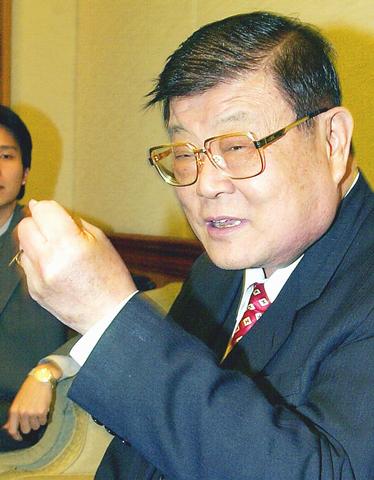Taipei prosecutors indicted a KMT lawmaker yesterday on check fraud charges and alleged he used his position to cover up the crime.
Prosecutors yesterday asked that Liao Hwu-peng (

PHOTO: CHU YU-PIN, TAIPEI TIMESN
Investigators say Liao wrote checks after being barred from doing so, and then told banking officials to alter the documents so the checks would be cleared.
On Aug. 11 last year, the Taipei Clearing House declared Liao's account to be "dishonored" after three of his checks had bounced.
The designation meant that Liao was barred from writing new checks and any items dated after Aug. 11 wouldn't be cleared.
But prosecutors say the lawmaker kept on writing checks after that date.
They say he threatened Pai Hui-hsiung (
In all, 81 checks worth more than NT$19.5 million were involved.
Liao yesterday said he was innocent of the charges and said the Bank of Taiwan should shoulder the blame.
The lawmaker said the bank on Sept. 14 of last year had informed him that his account had been declared a "dishonored" one. He said the bank had asked him to change the dates on items written after Aug. 11 so they would be cleared.
"So I gave them my stamp to do it," Liao said.
The lawmaker said he didn't understand what all the fuss was about, as the checks he wrote after Aug. 11 were paid.
"The checks I wrote after Aug. 11 were all cashed. I don't understand why the prosecutors want to indict me," he said.
Prosecutor Liu Cheng-wu (
Liu also said that Liao had asked his assistant, Soong Chun-lien (宋春蓮), to help.
"But he did it by himself as well," the prosecutor said. "Among the 81 checks, two of them were altered by Liao himself. It's quite ridiculous for him to do this as a lawmaker, especially when the bank is located inside the Legislative Yuan [building]."
In addition to Liao, prosecutors have also asked that Soong be sentenced to three-and-a-half years in prison, Pai to three years and Chao to two years.
Prosecutors have also asked that Hsu Man-tzu (
Last February, Liao was indicted for allegedly counterfeiting the stock certificates of Chimei Electronics and selling them to a man for NT$106 million. The case is still pending.
Liao has served six terms in the legislature, but he decided not to run in the Dec. 1 election after the KMT implemented more stringent rules on who could run under the party's banner.

INVESTIGATION: The case is the latest instance of a DPP figure being implicated in an espionage network accused of allegedly leaking information to Chinese intelligence Democratic Progressive Party (DPP) member Ho Jen-chieh (何仁傑) was detained and held incommunicado yesterday on suspicion of spying for China during his tenure as assistant to then-minister of foreign affairs Joseph Wu (吳釗燮). The Taipei District Prosecutors’ Office said Ho was implicated during its investigation into alleged spying activities by former Presidential Office consultant Wu Shang-yu (吳尚雨). Prosecutors said there is reason to believe Ho breached the National Security Act (國家安全法) by leaking classified Ministry of Foreign Affairs information to Chinese intelligence. Following interrogation, prosecutors petitioned the Taipei District Court to detain Ho, citing concerns over potential collusion or tampering of evidence. The

Seventy percent of middle and elementary schools now conduct English classes entirely in English, the Ministry of Education said, as it encourages schools nationwide to adopt this practice Minister of Education (MOE) Cheng Ying-yao (鄭英耀) is scheduled to present a report on the government’s bilingual education policy to the Legislative Yuan’s Education and Culture Committee today. The report would outline strategies aimed at expanding access to education, reducing regional disparities and improving talent cultivation. Implementation of bilingual education policies has varied across local governments, occasionally drawing public criticism. For example, some schools have required teachers of non-English subjects to pass English proficiency

‘FORM OF PROTEST’: The German Institute Taipei said it was ‘shocked’ to see Nazi symbolism used in connection with political aims as it condemned the incident Sung Chien-liang (宋建樑), who led efforts to recall Democratic Progressive Party (DPP) Legislator Lee Kun-cheng (李坤城), was released on bail of NT$80,000 yesterday amid an outcry over a Nazi armband he wore to questioning the night before. Sung arrived at the New Taipei City District Prosecutors’ Office for questioning in a recall petition forgery case on Tuesday night wearing a red armband bearing a swastika, carrying a copy of Adolf Hitler’s Mein Kampf and giving a Nazi salute. Sung left the building at 1:15am without the armband and apparently covering the book with a coat. This is a serious international scandal and Chinese

NEGOTIATIONS: The US response to the countermeasures and plans Taiwan presented has been positive, including boosting procurement and investment, the president said Taiwan is included in the first group for trade negotiations with the US, President William Lai (賴清德) said yesterday, as he seeks to shield Taiwanese exporters from a 32 percent tariff. In Washington, US Trade Representative Jamieson Greer said in an interview on Fox News on Thursday that he would speak to his Taiwanese and Israeli counterparts yesterday about tariffs after holding a long discussion with the Vietnamese earlier. US President Donald Trump on Wednesday postponed punishing levies on multiple trade partners, including Taiwan, for three months after trillions of US dollars were wiped off global markets. He has maintained a 10 percent